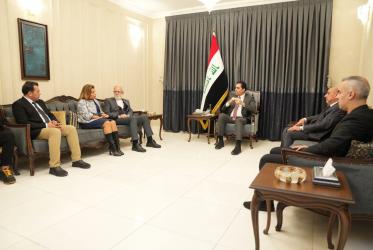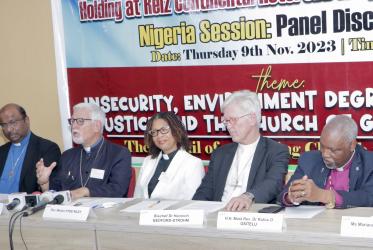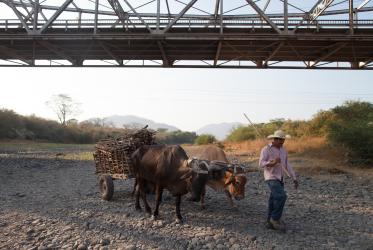This statement is also available in Arabic.
World Council of Churches
EXECUTIVE COMMITTEE
Bossey, Switzerland
13-18 November 2015
Doc. No. 28 rev
As adopted
As Jesus approached Jerusalem and saw the city, he wept over it and said, “If you, even you, had only known on this day what would bring you peace—but now it is hidden from your eyes.” Luke 19:41-42 NIV
The World Council of Churches (WCC) has long proclaimed a vision of peace with justice in Israel and Palestine based on mutual recognition, dialogue and understanding, and the effective implementation of a two-state solution leading to the two nations – Israelis and Palestinians – living alongside each other in peace and security.
The WCC executive committee, meeting in Geneva, Switzerland, on 13-18 November 2015, accordingly expresses its grave concern at recent developments in Israel and Palestine, involving renewed violent attacks against people of both communities and measures entailing long-term time division of access to Al-Aqsa mosque and affecting access to other holy sites. Such measures further diminish hope in the realization of this vision.
Neither the spate of individual violent attacks against Israelis, nor the violent response and extra-judicial killings that have followed, can be condoned. They further undermine hopes for peace, already seriously diminished by the perpetuation of the illegal occupation of the Palestinian territories, successive restrictions and impositions, growing settlement activity, impunity and the international community’s inadequate response. We are deeply concerned that this heightened sense of hopelessness and frustration risks generating further uncontrolled waves of violence, with tragic consequences for the people of the region.
The executive committee affirms the WCC’s rejection of violence and injustice, and reiterates its frequent call for respect for the human rights for all people of the region, regardless of their national, ethnic or religious identity. We renew the WCC’s denunciation of the occupation, as the key obstacle to peace. Ending the occupation is an essential foundation for any long-term, sustainable and just peace in the Holy Land. Further delay in achieving this end and fulfilling previous commitments can only lead to further loss of hope and trust, to the great detriment of both peoples.
The current spate of violence especially focuses on Jerusalem and access to the holy places. The executive committee therefore stresses the need for all political and religious leaders to respect the status quo of the Holy Land. The holy sites should not be instrumentalized in the political struggle between the Palestinian people and the Israeli occupation. The executive committee reaffirms and holds fast to the vision of Jerusalem as an open city, a city of two peoples and holy to three religions.
At this time of renewed violence and increased desperation, the executive committee expresses its solidarity with all those who seek peace in the region in the face of entrenched and intractable injustice. We pray for the witness and ministry of the churches and Palestinian Christians who continue to work for peace between the communities, for an end to occupation, for realization of the legitimate national aspirations of the Palestinian people, and for justice and peace to reign between Palestinians and Israelis, and between Muslims, Jews and Christians. We call for strengthened international ecumenical support for the continued presence and ministry of the Palestinian Christian community and the churches of the region.
The executive committee underlines in this context the significance of the WCC’s commitment to accompanying the churches and people of the region, expressed especially through the Jerusalem Inter-Church Centre (JIC), the Palestine Israel Ecumenical Forum (PIEF), and the Ecumenical Accompaniment Programme in Palestine and Israel (EAPPI).
We call once again on the international community to ensure implementation of all relevant UN commitments and resolutions, and to act decisively for a just and sustainable peace in Israel and Palestine, addressing not merely the symptoms of frustration and disillusionment born of inaction, but the root causes of this tragic conflict.




